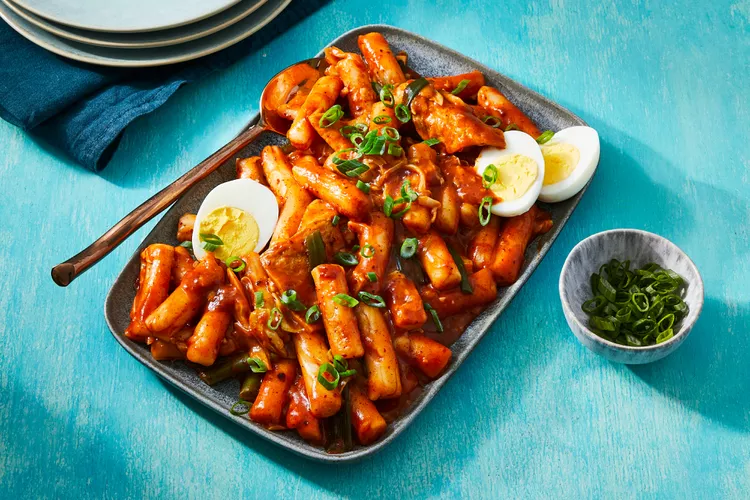Tteokbokki (Spicy Korean Rice Cakes)

Tteokbokki (pronounced duck-bow-kee) is a popular Korean street food made with chewy rice cakes and a garlicky, gochujang sauce. It's best served warm, topped with fresh green onions and hard boiled eggs. Tteokbokki is easy to customize with your favorite ingredients. It's often eaten with mozzarella cheese on top or alongside gyoza or noodles. Our recipe for Tteokbokki serves four and comes together in just 40 minutes.
How Do You Make Tteokbokki?
Tteokbokki starts with soaked rice cakes. Plan on soaking the rice cakes for at least 20 minutes but for better results, soak for at least an hour. This helps ensure they are the proper texture in the finished dish. A rich fish broth is the start of our Tteokbokki recipe and calls for dried anchovies and kelp. Once the broth is made, round out the sauce with sugar, soy sauce, garlic, and of course Korean chile. Add in the soaked rice cakes and fish cakes and cook the whole dish together until thick. You can adjust the sweetness of the finished dish with more or less sugar.
Where Can I Find Korean Rice Cakes (Tteok)?
Look for Korean rice cakes in Asian markets or online at retailers like Amazon. The shape used for this recipe is cylinder. If using fresh or frozen tteok, check the package for soaking instructions before making this Tteokbokki recipe.
Ingredients
-
4 cups water
-
7 oz dried anchovies
-
1 4x4-inch piece dried kelp
-
1 pound cylinder-shaped Korean rice cakes (tteok) soaked
-
1/4 to 1/3 cup gochujang paste
-
2 tablespoons sugar
-
1 tablespoon soy sauce
-
2 to 3 teaspoons gochugaru (Korean chili flakes)
-
3 cloves garlic, minced
-
1 cup chopped green cabbage
-
2 fish cake sheets, cut into 2-inch pieces
-
4 medium (4-1/8" long) green onions, cut into long pieces plus additional for garnish
-
2 large hard boiled eggs, halved
Directions
-
Soak your rice cakes for at least 20 minutes or according to package directions. In a medium saucepan combine the water, dried anchovies, and dried kelp. Bring to a boil over medium heat. Reduce the heat and simmer, uncovered, 10 minutes. Remove from the heat and using a slotted spoon, remove the anchovies and kelp; discard.
-
Stir the soaked rice cakes, gochujang, sugar, soy sauce, gochugaru, and garlic into the anchovy broth and return to a boil. Cook, stirring frequently, for 8 to 10 minutes or until the rice cakes are tender and the sauce is lightly thickened.
-
Stir in the cabbage, fish cakes, and green onions. Continue cooking about 5 minutes or until cabbage is tender and rice cakes are very tender. Remove from heat and stir in eggs. Serve topped with sliced green onion.
Nutrition Facts (per serving)
| 691 | Calories |
| 12g | Fat |
| 100g | Carbs |
| 45g | Protein |
| Nutrition Facts | |
|---|---|
| Servings Per Recipe 4 | |
| Calories 690.7 | |
| % Daily Value * | |
| Total Fat 11.9g | 15% |
| Saturated Fat 2.6g | 13% |
| Cholesterol 198.1mg | 66% |
| Sodium 5332.9mg | 232% |
| Total Carbohydrate 99.9g | 36% |
| Dietary Fiber 4.1g | 14% |
| Total Sugars 28.2g | |
| Protein 44.8g | 90% |
| Vitamin D 2.7mcg | 14% |
| Vitamin C 28.2mg | 31% |
| Calcium 189.5mg | 15% |
| Iron 3.2mg | 18% |
| Potassium 1127.4mg | 24% |
| Fatty acids, total trans 0g | |
| Vitamin D 109.7IU | |
| Alanine 2.6g | |
| Arginine 2.8g | |
| Ash 16.5g | |
| Aspartic acid 4.5g | |
| Caffeine 0mg | |
| Carotene, alpha 1mcg | |
| Choline, total 266.5mg | |
| Copper, Cu 0.3mg | |
| Cystine 0.6g | |
| Energy 2889.3kJ | |
| Fluoride, F 204.4mcg | |
| Folate, total 85.5mcg | |
| Glutamic acid 6.9g | |
| Glycine 2.1g | |
| Histidine 1.2g | |
| Isoleucine 2.1g | |
| Leucine 3.6g | |
| Lysine 3.7g | |
| Methionine 1.3g | |
| Magnesium, Mg 135.4mg | |
| Manganese, Mn 1.3mg | |
| Niacin 6.6mg | |
| Phosphorus, P 718.4mg | |
| Pantothenic acid 2.2mg | |
| Phenylalanine 1.9g | |
| Phytosterols 13.1mg | |
| Proline 1.7g | |
| Retinol 70.5mcg | |
| Selenium, Se 98.7mcg | |
| Serine 2g | |
| Starch 0g | |
| Theobromine 0mg | |
| Threonine 1.9g | |
| Vitamin E (alpha-tocopherol) 2.9mg | |
| Tryptophan 0.5g | |
| Tyrosine 1.6g | |
| Valine 2.4g | |
| Vitamin A, IU 813.6IU | |
| Vitamin A, RAE 99.4mcg | |
| Vitamin B-12 5.6mcg | |
| Vitamin B-6 1mg | |
| Vitamin K (phylloquinone) 115.7mcg | |
| Water 431.3g | |
| Zinc, Zn 2.4mg | |
*The % Daily Value (DV) tells you how much a nutrient in a food serving contributes to a daily diet. 2,000 calories a day is used for general nutrition advice.